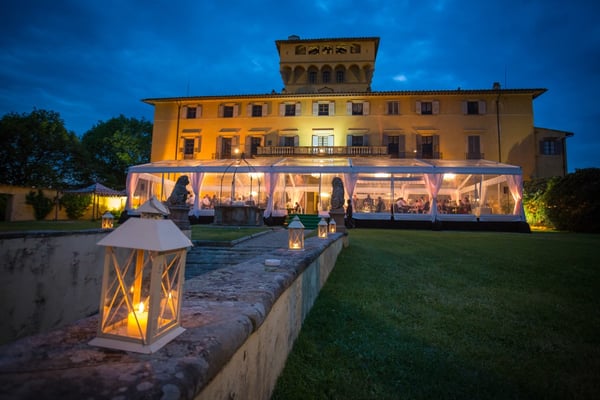For many people (like us), planning is the fun part. You have an event goal, and the rest is a blank canvas. As you start narrowing down what you want and need, event sourcing can be a challenge and has become even more challenging over the last few years. But challenges can be overcome, and thankfully, there are several strategies to help you produce the corporate event you envision.
Quick Links
- What Is Corporate Event Sourcing?
- The Importance of Corporate Event Sourcing and Contracting
- Challenges to Sourcing and Contracting
- Overcoming Corporate Event Sourcing Challenges

What Is Corporate Event Sourcing?
Corporate event sourcing is the process by which corporate event planners find, identify, and hire the vendors, most often venues, who help host and produce corporate events. More often than not, this focuses on venues simply because venues can provide additional services, such as on-site or in-house catering, and because it can easily be the largest segment of your budget.
In other cases, such as one where food and beverage are not included, corporate event sourcing might also involve other vendors necessary to produce an event.
The Importance of Corporate Event Sourcing and Contracting
The most important reason you need to prioritize corporate event sourcing, particularly venue sourcing, is that you (obviously) need a place to host your event. Additionally, venues typically take up a large portion of an event budget, making it the most important decision to get right. Until the perfect place is locked down, everything else is on hold from marketing and design to scheduling.
Whether you’re an event planner or part of an event planning committee, it should come as no surprise that having the proverbial ducks in a row prior to making any event communications or announcements is important. And when it comes to major corporate events (such as a destination meeting, incentive trip, major milestone, production launch, or national meeting), being sure you’re ready to meet and accommodate your guests is an essential first step.
Due to sourcing challenges, going into event planning with enough lead time is imperative when it comes to effectively sourcing and contracting vendors. Other considerations and constraints (such as event budget, timing, and attendee count) may also impact your ability to cover these necessities in a short amount of time.
 Challenges to Sourcing and Contracting
Challenges to Sourcing and Contracting
There’s little doubt that in a post-COVID world, corporate event sourcing has changed. Not only are venues still struggling with staffing issues, but there’s been a massive swell of interest in in-person events. As one can imagine, the two put a significant strain on what venues and vendors can do.
In addition to and because of those market forces, vendors, venues, and event planners are facing other challenges.
1. Limited space and limited holds
Not only are venues buckling under the demand in terms of capacity, but that same demand is also limiting how long they’re willing to hold a space while you decide on a venue. In the past, some venues could host two to three events at a time, but staffing concerns might limit their capacity. Because of this, venues are hesitant to hold space; instead, they’re signing with someone who’s ready to commit.
Similarly, many venues are limiting first-option holds as well. Previously, that meant you had the right of refusal, but the space was held for you until you decided. Many venues no longer offer that at all. Instead, holds are often shared with other organizations interested in the same space. Again, quick decisions are required.
2. More fees, increased charges, higher deposits
Much like a seller’s housing market, a lot of the control right now resides with venues and vendors. They’re struggling in their own ways as well, especially with rising costs and staffing shortages, and that means they’re passing along those costs to you. From service charges and resort fees to higher deposits, vendors are asking for more and more upfront.
This becomes a bigger issue for planning when you’re hoping to put something together last minute and billing/procurement takes longer than you’d like or than the venue will accept.
3. Increased rental rates and fewer reductions
Outside of fees and charges, the rate to rent a room at a venue has risen. That means if you’re trying to stay within budget, be mindful of the setup and strike time. You may need to be faster than normal to save you from renting a room for an extra day. That, in turn, may mean more help and staff on your part, so all of this should be considered during the budgeting process.
In the past, many venues would offer discounts based on terms or number of guests, but given the demand, few are willing to extend those same rate reductions.
 Overcoming Corporate Event Sourcing Challenges
Overcoming Corporate Event Sourcing Challenges
With these challenges and limitations, working with an experienced event planner who can help you navigate tricky waters is essential. While that’s always a good strategy, there are some additional steps and measures you can take to overcome corporate event sourcing challenges.
1. Have a clear, firm budget and timeline
Few things can take the wind out of your sails quite like finding the perfect venue and discovering that you don’t have the time or money to make it happen. This is especially true if it’s a venue you’ve worked with in the past, but they’ve increased rates, fees, and more, which has put it out of reach.
Budgeting both time and money is the best way to be prepared for expenses and unforeseen issues, such as a venue change due to an unavailable first choice.
2. Understand your needs
While it’s important that you stay flexible, your vendors and venues may not be as flexible. Go into your sourcing with target dates, meeting schedules, attendee head counts, and an understanding of what and how many spaces you’ll need. The more precise you can be at the onset, the more willing a vendor may be to work with you. Last-minute changes complicate things and can complicate the relationship. When dealing with budget constraints, it's essential to communicate openly with the venue. This upfront approach can help filter out venues that may not be suitable for your needs.
Additionally, staying flexible with your event's target dates can work to your advantage. If your event aligns well with the venue's existing calendar, they are more likely to be accommodating. For example, if you typically host your program on a Thursday/Friday pattern, but the venue already has a booking for that space on Friday and Saturday, considering shifting your event to a Wednesday/Thursday pattern could be the key to securing the right venue.
Remember, vacant space in a hotel or venue represents a lost revenue opportunity for them. By being open to adjusting dates, you not only increase the chances of finding a suitable venue, but you also allow the venue to monetize space that might have otherwise remained unused.
3. Think creatively
Creative use of space and layout, as well as design elements, can transform a space. If something fits your budget and timeline but is less than ideal for size, consider what you can do with the space. Staying flexible and using a creative strategy will come in handy, and the right event planner can help you reimagine how space is used. Utilizing different areas within a venue creatively (such as reusing space, turning a lobby into a cocktail hour, or tapping into outdoor spaces) can create a unique experience.
Don’t forget to collaborate with the venue's event planners and staff, tapping into their expertise and knowledge of the space's potential. Remember, they’re in their space daily and have seen plenty of events come before yours. By embracing imagination and ingenuity, hotel and venue spaces can be transformed into captivating environments that leave a lasting impression on attendees.
4. Consider off-season for destinations
When it comes to availability and pricing, you’ll run into the biggest issues during peak season, especially if you’re picking a popular destination for your meeting or incentive program. Off-season or off-peak can increase availability and lower prices, though it may limit activities, so that’s something you’ll want to consider.
5. Work with an event planner
If you’re heading into unknown territory, hiring a guide is essential, and in this case, an event planner can help you in a number of different ways. They can navigate changes, explore options, look at your needs and what’s available creatively, and help you get what you need when you need it – all within your budget.
With decades of experience planning events and a few years of traversing the new event-sourcing terrain, event planners like Bishop-McCann can be your biggest asset when it comes to stretching your budget and space needs. And with a creative team who’s seen it all, they can – quite literally – make magic happen that will delight your guests, without them ever knowing the challenges of finding the suitable space. In other words, event planners will make it feel like the right space whether it’s their first choice or fifth.
If you’re ready to start planning and discussing how Bishop-McCann can turn your sourcing challenges into event successes, reach out today!
